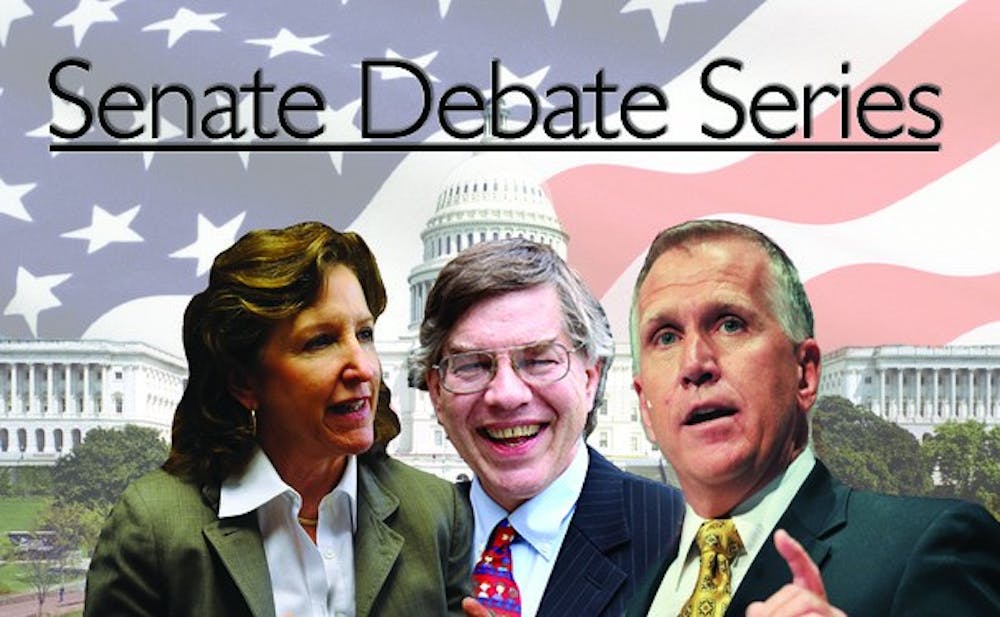North Carolina U.S. Senate race contenders Kay Hagan, Thom Tillis and Sean Haugh concluded the election cycle's debate series with a third round of policy discussion Thursday night.
The debate—hosted in Wilmington by the League of Women Voters—was the first to feature Haugh, a Libertarian candidate. Hagan, the incumbent Democratic senator, and Republican N.C. House Speaker Tillis have been switching leads in public polls, with a recent poll released Wednesday giving Hagan a very narrow lead.
The debate focused on issues ranging from the containment of Ebola to the ISIS threat in the Middle East. See below for a rundown of the main topics covered.
The role of government
One of the topics that generated the most cross-fire between contenders was that of the roles and responsibilities of a government representative, such as attendance at important voting sessions. Tillis and Hagan both pointed out flaws in the others' current duties in government, with Tillis specifically accusing Hagan of missing important policy meetings for cocktail fundraisers in New York City, and Hagan calling Tillis "spineless" because he is indecisive about what to do about ISIS.
Haugh—who does not currently hold a position in government and instead works as a pizza deliverer—questioned how much progress was being made at such meetings.
"There are other parts of the job description to senator beside simply sitting in meetings,” he said.
Another point of contention was over the candidates benefitting personally from policies they have helped to pass. Both Hagan and Tillis brought up instances when each profited from recovery tax credits.
"This kind of situation arises simply because Washington claims to have control on every aspect of our lives,” Haugh said.
Hot campaign topics
The rest of the debate centered around controversial issues and platform policy, such as same sex-marriage. Hagan and Haugh both criticized Tillis' support for Amendment One—legislation that makes it unconstitutional for North Carolina to recognize or perform same-sex marriages or civil unions.
“I find the gay marriage issue off-putting because its not my position to judge who [one] loves or how they love," Haugh said. "It should be totally up to you.”
Hagan added that “what Tillis has done [with Amendment One] is hurting the economy and children.” Tillis' rebuttal focused on the fact that the majority of North Carolinians support marriage as an institution between a male and a female.
Wage issues included both the raising of minimum wage and equal pay for men and women. Hagan supported both ideas, stating her desire to raise minimum wage to $10 and bring equal wages to both genders, but Tillis argued that raising the minimum wage was not the solution to improve the economy.
"People will lose jobs and businesses will go down because of the burden of increasing wages," Tillis said.
Natural gas, oil drilling and energy sources in North Carolina were also discussed at length, especially in the context of national governmental oversight of the environment. Haugh and Tillis both expressed dissatisfaction with the U.S. Environmental Protection Agency's presence in North Carolina coastal areas.
"Hagan supports policies that will raise power related costs by $1,200 per year," Tillis said. "[People will] have to choose between paying for heat or food. "
The Ebola virus and potential travel restrictions was another pressing issue discussed by the debaters. Hagan expressed support for travel bans as well as ground troops, education programs and funding for health care facilities in affected areas. Haugh pointed out that the idea of total bans is unrealistic.
"[Senators] don’t have a magic wand that lets us ban things automatically," Haugh said. "I would want to go to [the Centers for Disease Control and Prevention] scientists to see what their plan is, and if there are other ways to stop this beside travel bans."
Third party candidate in the mix
Thursday's debate was first to feature Haugh alongside Hagan and Tillis. Haugh argued in his opening statement that that the United States needs to limit military engagement and excessive spending. He pointed out that one of his motivations in running for the Senate seat was because “those kind of solutions weren’t being offered by either of the candidates.”
Haugh's closing words also expressed his desire as a third party candidate to get a message across all party lines regardless of the outcome.
"I get the Democrats and Republicans confused," he said. "Its easy to do. This is a message to Democrats and Republicans—you're both going to have to be more peaceful.”
Get The Chronicle straight to your inbox
Signup for our weekly newsletter. Cancel at any time.

